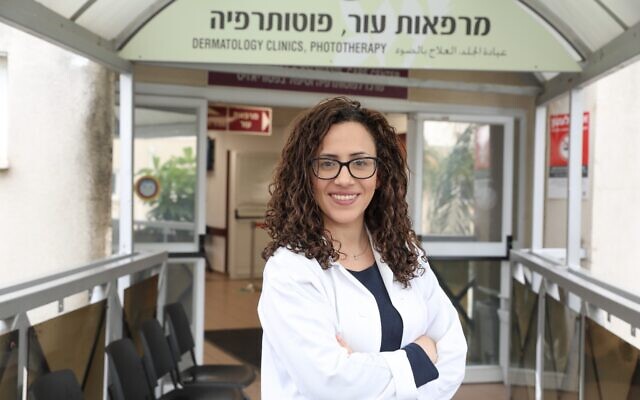Israel sees its first-ever case of rare rapid aging ‘Benjamin Button’ disease
2-month-old girl is being treated at Haifa’s Rambam hospital; children with progeria disorder age extremely quickly and suffer ailments of the elderly while still very young
Renee Ghert-Zand is a reporter and feature writer for The Times of Israel.
The first case of progeria in Israel, a rare genetic syndrome causing children to age rapidly, has been diagnosed in a baby girl at Rambam Medical Center in Haifa. The disease is extremely rare and has been identified in only 142 children worldwide.
Progeria is also known as Hutchinson-Gilford Progeria Syndrome (HGPS), and colloquially as Benjamin Button disease, after the 1922 F. Scott Fitzgerald short story “The Curious Case of Benjamin Button,” in which a boy is born looking like an old man (though in the book he — impossibly — ages in reverse).
The public also learned of the disorder through the bestselling 1981 book by Rabbi Harold S. Kushner titled, “When Bad Things Happen to Good People.” In the book, Kushner wrestled with questions of God and suffering following the death of his son Aaron from progeria.
The diagnosis of the 2-month-old Israeli girl, who seemed normal at birth, was made by Dr. Hiba Zaaroura, head of Rambam’s pediatric dermatology unit.
“The parents brought the child to us because they noticed unusual things with her skin. The skin was tough. We saw sclerodermoid changes in the chest and legs. Everything started from there,” Zaaroura told The Times of Israel.
The baby also had facial characteristics that are common among individuals with progeria. These typically include a head that is large in comparison with the face; a small jaw, chin, and mouth; thin lips; a beak-like nose; and large eyes over which eyelids do not completely close.

“The diagnosis was confirmed through genetic testing for the single gene mutation that causes the syndrome,” Zaaroura said.
Progeria is an autosomal dominant disorder caused by a mutation to the lamin A (LMNA) gene. LMNA makes a protein that holds the nucleus of the cell together. The LMNA mutation causes a flawed protein called progerin to be made. The progerin makes cells unstable and causes the cells to age more quickly than normal.
The genetic mutation is believed to be sporadic and there have been some documented cases of siblings with progeria.
The diagnosed child will be cared for in Israel by a team of medical specialists, who will address the rapid aging process. She will also receive Lonafarnib, an oral farnesyltransferase inhibitor — the only available drug thus far for treating progeria. The drug can start being administered only when the child reaches one year of age.
“The drug was only made available in November 2020, so we don’t have any long-term studies on it. However, it is believed that it can add two years to the life expectancy of a progeria patient,” Zaaroura said.
The average life expectancy for a child with the syndrome is 13 to 15 years. In the meantime, the child rapidly ages and develops a host of health problems usually associated with the elderly.
“The child must be followed by a cardiologist because they develop atherosclerosis in their blood vessels, putting them at risk for cardiac issues and strokes. They must also be followed by a gastroenterologist because of problems with growing,” Zaaroura said.
The children must also contend with many other problems associated with the elderly, such as hair loss and bone and joint maladies.
All the while, progeria patients are normal cognitively. They can learn and develop their minds like other children, but become frail and are unable to be as physically active as their peers.
Zaaroura confirmed that the baby girl will be cared for by physicians in Israel as she grows up.
“We have reached out to the Progeria Research Foundation in the United States and are getting the support and information we need from them,” she said.










